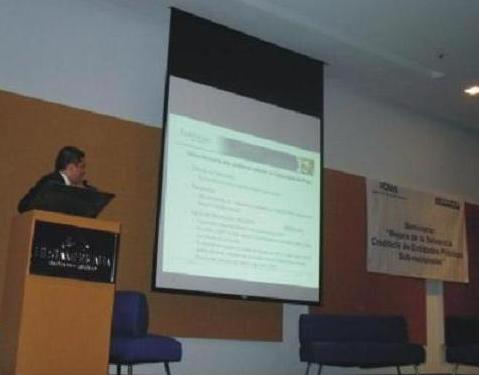
Following a successful pilot year, ICMA Latinoamérica (ICMA-LA) will expand the Regional Credit Rating Improvement (RCRI) program beyond its initial activities in Mexico and begin working with jurisdictions in Costa Rica and possibly Argentina. The program, which started in 2009, has worked with cities, states, and other subnational authorities in Mexico to improve their credit ratings so that they can borrow at more favorable rates.
The expansion is made possible by a $455,000 grant from the World Bank through the Public-Private Infrastructure Advisory Facility (PPIAF). ICMA-LA is ICMA’s partner organization based in Guadalajara, Mexico, and the project is part of its broader goal of improving the quality of management in Latin American countries.
Three Mexican jurisdictions were selected for the Phase I pilot, based on the following criteria:
- They intended to borrow from banks or bond markets within the next 18 months.
- Their anticipated borrowing was for infrastructure projects that were expected to help reduce poverty and promote sustainable development.
- They were committed to financial management reform.
- They were willing to commit the resources to make improvements in their credit ratings.
During Phase I, ICMA-LA partnered the three jurisdictions with pro bono managers and finance professionals from U.S. cities and counties, using city-to-city exchanges based on the ICMA CityLinks model:
- The state of Jalisco was matched with Deputy City Manager (now City Manager) David Cavazos and Finance Director Jeff Dewitt from Phoenix, Arizona.
- The state of Guerrero was matched with Deputy City Manager William Studer and Finance Director Carmen Arrieta-Candelaria from El Paso, Texas.
- The municipality of Puebla was matched with Finance Director Jesús Nava from Burlingame, California, and with John Daly, a former city manager currently serving as Manager/Director of the Genesee County Road Commission, Flint, Michigan.
ICMA-LA also planned and delivered two workshops focusing on ways to improve creditworthiness. The first, in Mexico City in June 2009, attracted 48 officials representing four states, seven municipalities, two private water utilities that contract to provide services to municipalities, and two associations (the national water utilities association and one of the national municipal associations).
The second workshop, in Panama City, Panama, in February 2010, was made available online, so it served remote participants as well as those who attended in person. The presentations from the workshop are also posted on the ICMA-LA website.
The CityLinks exchanges produced the following results:
- The U.S. officials prepared diagnostic assessments and recommendations for each municipality, based on its organizational structure, credit history, and relationship with the rating agencies.
- Based on these assessments and recommendations, each jurisdiction developed a plan to make improvements in its creditworthiness.
- The jurisdictions began implementing the plans, with ongoing advice from Mexican consultants.
- In January 2010 a delegation of officials from the state of Jalisco visited Phoenix and officials from the municipality of Puebla visited Burlingame; in March, officials from the state of Puebla visited El Paso.
- All three Mexican entities developed stronger financial policies for debt and budget management and developed a multiyear budget forecast model.
- Two of the Mexican entities, the municipality of Puebla and the state of Guerrero, were able to obtain credit for infrastructure projects based on their sound financial conditions on a year when many Mexican entities had their credit rating lowered.
These accomplishments are taking place within a global financial context in which liquidity is tight, and lenders are scrutinizing the creditworthiness of potential borrowers very carefully. Yet many potential borrowers in Latin America have no source of step-by-step guidance for implementing practical measures that will strengthen their positions.
This kind of practical assistance will continue under Phase II, known as the Credit Rating Improvement Program for Sub-National Authorities in Latin America. Focusing on Costa Rica and possibly Argentina, the program will be delivered by U.S. officials, Mexican officials trained during the first phase, and local/regional consultants as needed. The following Costa Rican cities will partner with U.S. professionals and jurisdictions that participated in Phase I:
- The municipalities of Esparza and San Carlos will partner with Burlingame and the Genesee County Road Commission
- The municipality of Cartago and the regional electric utility JASEC (based in Cartago) will partner with the professionals from El Paso.
In this phase, ICMA-LA will:
- Facilitate visits between the partner jurisdictions in late September
- Provide advisory services, including a creditworthiness diagnostic and assistance in developing an implementation plan, as in Phase I
- Facilitate “shadow” credit ratings as needed to serve as proxy measures in jurisdictions that have no current rating
- Organize and conduct a virtual workshop for jurisdictions from the region to identify and share lessons learned and develop plans for extending the program to additional countries in Latin America
- Document management actions that can improve creditworthiness—and that are under local control.
Phase II began in March 2010 and will continue through February 2011.
For additional information about ICMA’s international activities, visit the ICMA website or contact international@icma.org. For information about ICMA Latinoamérica en español, visit http://www.icmala.org/.
New, Reduced Membership Dues
A new, reduced dues rate is available for CAOs/ACAOs, along with additional discounts for those in smaller communities, has been implemented. Learn more and be sure to join or renew today!
